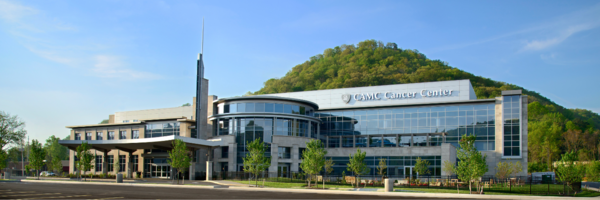Comprehensive Clinical Training
The mission of the CAMC Hematology and Medical Oncology Fellowship program is to develop outstanding subspecialists in hematology and medical oncology who will be leaders in their area of interest and setting of their choice.
Our program offers educational opportunities through direct patient care, conference attendance, peer-reviewed, evidence-based information, current research applications for patient care and supervision from board-certified hematologists and medical oncologists. The patient population at the CAMC Cancer Center consists of individuals from very diverse backgrounds with various cancer diagnoses.
CAMC Cancer Center provides diagnosis-specific subspecialties, including Breast, Gastrointestinal, Genitourinary, Gynecologic Oncology, Hematologic Malignancies, Lung, and Head and Neck cancers.
Goals of the Hematology and Medical Oncology Program
The goal of the Hematology and Medical Oncology Fellowship program is to provide quality subspecialty training to fellows in the combined disciplines of hematology and medical oncology so that trainees will be able to function competently as clinical consultants, provide high-quality direct patient care (both inpatient and outpatient) and perform related procedures competently. Training builds upon and extends six general core competencies developed in residency training:
- Patient care and procedural skills
- Medical knowledge
- Practice-based learning and improvement
- Interpersonal and communication skills
- Professionalism
- System-based practice
The program seeks to prepare subspecialists for future careers in clinical practice or academic/research settings. It aims to achieve these goals through appropriate clinical experience under the supervision of qualified and dedicated faculty, didactic exercises and exposure to direct experience in clinical/based science investigation.
Didactics
The CAMC Hematology and Medical Oncology Fellowship strives to provide an immersive and multidisciplinary educational environment that equips our fellows with a deep understanding of the scientific underpinnings of hematologic and oncologic diseases. Through Core Curriculum Conference series, Clinical Case Conferences, Journal Club, Morbidity and Mortality Conferences, Quality Improvement Conferences, Research Conferences and Tumor Boards, the program will foster critical thinking, lifelong learning and the ability to translate research into practice.
Core Lecture Topics:
- Gastrointestinal cancers
- Genitourinary cancers
- Lung/Thoracic cancers
- Breast cancer
- Pharmacology
- Clinical Trials/Cancer Research
- Gynecology-Oncology cancers
- Head and Neck cancers
- Research and clinical trials
- Benign Hematology
- Hematologic Malignancy
- Bone Marrow Transplant at the University of Pittsburgh Medical Center
- Supportive Care
Procedures
Procedural competence will be determined by simulation training and direct patient care supervision. Specialty-specific procedures will initially be learned in a simulation lab with didactics and hands-on experience, demonstrating competence with a key understanding of the procedure. The procedural competence of fellows' techniques for all procedures will be evaluated by an appropriately credentialed board-certified faculty physician using a "procedure evaluation form." A procedure log will also be kept by the fellow and reviewed individually to ensure adequate numbers of procedures as defined by ACGME, the American Society of Hematology (ASH) and the American Society of Clinical Oncology (ASCO). Procedure logs will be reviewed with fellows as part of the semi-annual evaluation process, with the potential to be addressed in customized learning plans where deficiencies are noted.
Research Opportunities
Research is a valuable opportunity during the fellowship. Research Day is held every year, and residents and fellows participate yearly.
Salary and Benefits
CAMC offers a comprehensive salary and benefit package for residents and fellows.
Explore Charleston and West Virginia
Charleston is a small city with a metropolitan culture, and is close to some of the best outdoor recreation in the country.



